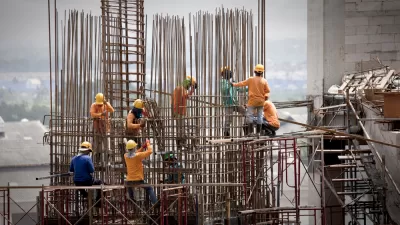Zoning isn’t just a tool of self interest, according to a recent polemic by USC planning professor Lisa Schweitzer.
Lisa Schweitzer, an urban planning professor at the University of Southern California, recently penned an editorial that argues a communitarian case for zoning that counters some of the prevailing wisdom of supply-side arguments favored by liberals and libertarians alike.
Schweitzer's post was inspired by another post by one her former students, and former Planetizen blogger Shane Phillips, which editorialized the recent housing and planning controversies in Palo Alto, California. Schweitzer's purpose is actually to argue against some of the assumptions that connect anti-growth sentiment to the self-interest of property owners.
There are multiple reasons why I think planners and market liberals like Phillips need to back off a little bit on assuming anti-growth sentiment stems from mere homeowner self-interest. I don’t buy that it’s an “evil Baby Boomers versus Wonderful, Urbanity-Loving Millenials [sic]” conflict either, as gratifying as it is for this here Gen-Xer to watch those groups blame each other. American suburbanization started long before the Boomers showed up. Nor am I convinced that homeowners necessarily just have one interest, financial, in zoning. Given that I am likely to get raked over the coals for this post, I want to repeat: the Homevoter Hypothesis is important to understanding urban politics and development. But it’s partial. That’s my argument.
For a more complete understanding of urban politics and development, Schweitzer examines the concept of exclusion:
If you look at ‘exclusion’ as a big, social and political phenomenon instead of just in terms of local zoning and development spats, the arguments for exclusion combine both communitarian concerns about identity and stability and self-determination with economic concerns.
That's a much more sympathetic viewpoint on the concept of exclusion that many urbanists are willing to allow. "Thus communitarians’ arguments for exclusion occur at just about every level of political community, and those communitarian arguments probably deserve more attention than they get in discussions over zoning," adds Schweitzer.
The article is a highly recommended read for anyone willing to put aside assumptions and continue to push the conversation to higher levels of understanding.
FULL STORY: The communitarian case for zoning that planners do not talk about

Alabama: Trump Terminates Settlements for Black Communities Harmed By Raw Sewage
Trump deemed the landmark civil rights agreement “illegal DEI and environmental justice policy.”

Study: Maui’s Plan to Convert Vacation Rentals to Long-Term Housing Could Cause Nearly $1 Billion Economic Loss
The plan would reduce visitor accommodation by 25% resulting in 1,900 jobs lost.

Planetizen Federal Action Tracker
A weekly monitor of how Trump’s orders and actions are impacting planners and planning in America.

Wind Energy on the Rise Despite Federal Policy Reversal
The Trump administration is revoking federal support for renewable energy, but demand for new projects continues unabated.

Passengers Flock to Caltrain After Electrification
The new electric trains are running faster and more reliably, leading to strong ridership growth on the Bay Area rail system.

Texas Churches Rally Behind ‘Yes in God’s Back Yard’ Legislation
Religious leaders want the state to reduce zoning regulations to streamline leasing church-owned land to housing developers.
Urban Design for Planners 1: Software Tools
This six-course series explores essential urban design concepts using open source software and equips planners with the tools they need to participate fully in the urban design process.
Planning for Universal Design
Learn the tools for implementing Universal Design in planning regulations.
Caltrans
Smith Gee Studio
Institute for Housing and Urban Development Studies (IHS)
City of Grandview
Harvard GSD Executive Education
Toledo-Lucas County Plan Commissions
Salt Lake City
NYU Wagner Graduate School of Public Service





























